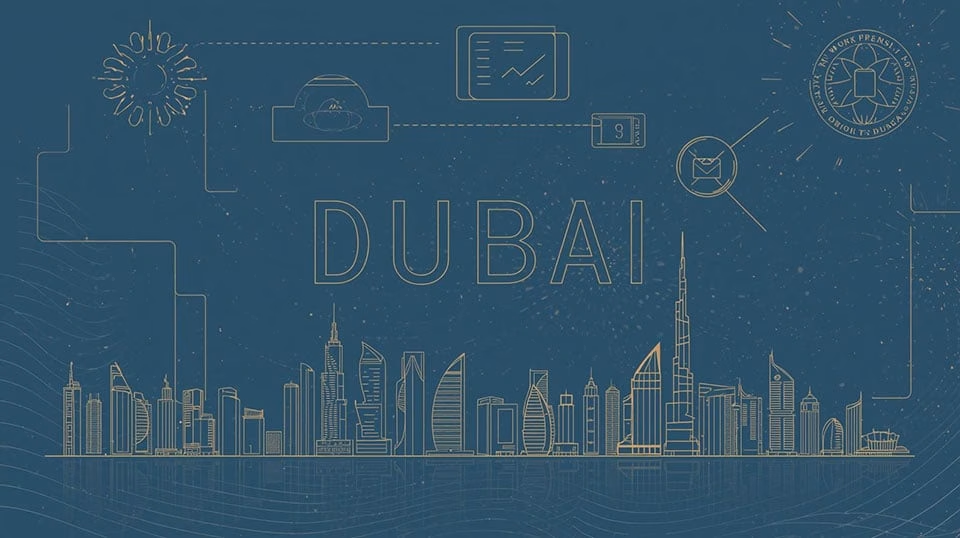For many expatriates, the UAE isn’t just another destination—it’s where they come to work, earn, and build a future. To do that legally, the first requirement is a UAE work permit.
This permit ties directly to everything else: the residence visa, opening a bank account, health insurance, and the right to stay in the country without problems.
In the past, getting that permit was often slow and paperwork-heavy. But in 2025, things are changing with the introduction of the digital work permit UAE, designed to make the process faster and easier.
With most steps now handled online, applications and renewals are faster, easier, and far less dependent on in-person visits to government offices. There isn’t just one permit, though. The work permit types UAE authorities issue depend on the job, the sector, and sometimes the location.
A private company, a free zone business, and a part-time role can each require a different path. Knowing which one applies to you can save headaches later. This guide looks at how the system works in 2025, the options available, and what has changed with the move to digital.
Understanding the UAE Work Permit: Why It Matters
Match titles exactly
Make sure your job title on your employment contract matches what’s on the work permit application. That small detail can save you big headaches.
Have valid licensing in place
Your employer must hold a valid trade licence and stay compliant—missing this can stall or cancel your permit.
Know the type of permit you need
The UAE awards different permits—standard, part‑time, freelance, mission, or free‑zone. Choose the right one from the start. It’s not one-size-fits-all.
Handle medicals and IDs early
After you arrive, book your medical fitness check and Emirates ID appointment soon. These come fast, but missing the window can delay your residence visa.
Check your visa type if you’re already in UAE
If you’re there on a visit visa, know that you’ll need to convert it officially through an employment permit—don’t just start working without it.

Types of UAE Work Permits You Should Know
Choose the right permit for your situation
The work permit types the UAE offers cover a wide range, each serving a specific purpose. Examples include the Standard Visa, Green Visa, and Golden Visa. The standard is employer-sponsored and lasts two to three years.
The Green visa suits freelancers or self‑employed people, and the Golden visa offers long‑term residency to high achievers without needing a sponsor.
Going freelance? Choose a self‑sponsored path
If you’re self‑employed or a freelancer, the Green visa gives five years of residency with more flexibility. It frees you from traditional sponsorship rules.
Golden visa offers perks and security
Got unique talents, top qualifications, or solid investments? The Golden visa (5 or 10 years) lets you stay longer, sponsor family, and work without local backing.
Be cautious with visa job offers
Working on a visit visa without a proper permit is risky. Some expats start jobs only to be stranded without legal rights or contracts—and that can cost them dearly.
Match the permit to your type of work
Whether you’re aiming for a part‑time role, a transfer, or a free‑zone job, each path has its own permit. Picking the wrong one can slow things down or cause complications.
2025 Work Permit Process: What’s New & Digitized
Say goodbye to paper mountains
In 2025, MoHRE rolled out the Work Bundle, an integrated platform that supports the digital work permit UAE system. It brings applications, renewals, cancellations, medical exams, and Emirates ID setup together. It cuts paperwork from 30 documents to just 5—and reduces waiting from 30 working days to about 5.
Apply from wherever you are
Employers can now submit work permit applications through MoHRE’s website or mobile app. No more standing in lines. You get real‑time updates, and AI tools help verify documents on the spot.
AI speeds things up
The new digital system even uses AI to check your application instantly—bypassing bureaucracy and making fast decisions. The aim? Permits in seconds.
Temporary permits now come with deadlines, too
Temporary or mission work permits must be fully completed within 60 days—no extensions allowed. You’ll need your photo, passport, signed offer, and any needed certificates ready to go.
All in one place
The move towards digital means everything—quotas, permit approvals, medicals, and ID—can be tracked through MoHRE’s smart systems using UAE Pass.
How to Apply: Step-by-Step Guide for Employers
Get that job offer signed
The first move is simple: issue an official job offer and get the employment contract signed. Make sure it includes the role, salary, working hours, and duration. This becomes the foundation of everything that follows.
Submit the permit application online
Employers should use MoHRE’s online portal—or the Work Bundle system—to apply for the work permit. Prepare essential documents like a passport copy, job contract, photos, and attested certificates.
Grab your entry visa
Once the permit is approved, an entry permit (sometimes called a “pink visa”) is issued. If the candidate is inside the UAE already, the process switches to a status change instead.
Handle formalities once the employee arrives
After arrival, arrange a medical fitness test and the Emirates ID application. The employer must then submit documents for visa stamping.
Track progress and wrap it up
Expect 10 to 21 working days for the full process—from job offer to residence visa and ID. Stay in the loop by monitoring through the digital portal.

Entry Permit, Emirates ID, and Medical Fitness Explained
An Entry Permit is your green light to enter
Before stepping foot here to work, you’ll need an entry permit. Your employer arranges it. Make sure your passport is still valid (at least six months) and you have valid health insurance lined up.
Medical check is a must—don’t skip it
Once you enter, book your medical fitness test quickly. This takes about 10–30 minutes at approved centers like Smart Salem. You’ll go through blood tests (for HIV, hepatitis, syphilis) and a chest X-ray for TB. Results usually come in within a day or two.
Pass the test for your residence visa to move on
The medical results go straight to the authorities electronically. Once you’re cleared, you’re one step closer to your residence visa—and you’ll need the same clearance for renewal too.
Emirates ID is your everyday key
After the medical, schedule your Emirates ID appointment. You’ll visit a typing center or Amer center to submit your documents, then head to an ICP center for biometrics (fingerprints and photo). Once that’s done, your ID is processed.
Digital Platforms and Apps for Work Permit Applications
Most of the work permit process in the UAE is now handled through digital work permit UAE services provided by MoHRE. Employers now use the Work Bundle platform, a unified hub that combines permit issuance, renewals, cancellations, medical checks, and Emirates ID procedures into one workflow. That cuts steps and documents dramatically—and lets them apply from their computers or phones.
There’s also the MoHRE mobile app, which supports employers and employees alike. Through the app, users can submit or track permit requests, manage contracts, lodge complaints, or check visa status—all from anywhere.
New automated tools make the system faster, with AI checking documents almost instantly. Paperwork is nearly gone. The system flags missing files right away, letting users fix issues before submitting.
Below is a simple overview of the key digital tools:
| Platform/App | What It Does |
| Work Bundle | One-stop web portal combining permit issuance, renewals, medical checks, and Emirates ID workflows |
| MoHRE Mobile App | Lets employers and workers apply for permits, view contracts, check status, and lodge complaints—all on the go |
| AI-driven Verification | Instantly checks uploaded documents, reducing errors and paper use, and allows near real-time approvals |
Common Requirements & Employer Compliance Checklist
You might think that hiring in the UAE is just about finding the right person. But that’s not the case. Employers also need to meet a set of rules before a work permit is approved.
First, a business license.
A company must have a valid business license. Be aware that if the license has expired or has violations, a license will not be issued in such circumstances.
Right job title.
The role offered should match the company’s registered business activity. A mismatch can block the application.
Employment contract.
Every worker needs a written contract, signed and filed with MoHRE or the free zone authority. It must clearly state pay, hours, and probation terms.
Wage Protection System (WPS).
Salaries have to be paid through WPS. Late or missing payments lead to fines and suspension of new permits.
Deadlines matter.
Employers should track the expiry of work permits and residence visas. Renew early to avoid penalties.
Emiratization.
National employment quotas are important, and larger companies should pay attention to them. Missing the target brings heavy monthly fines.

Processing Times & Fee Breakdown by Permit Type
When people ask about work permits, they usually want two things: how much time it takes and how much money it costs. In terms of timing, the whole process—from entry permit to Emirates ID—normally runs anywhere between two and six weeks.
Digital systems have made it quicker, so in many cases, the first approval comes within just a few working days.
How long does it take?
Most employers report it takes around 2–6 weeks for the work permit and visa process to go through, depending on how quickly the paperwork is filed and what permit type is involved. That includes an entry permit, a medical test, an Emirates ID, and visa stamping.
Often, if everything’s in order, some steps—like issuing the entry permit—now finish in as little as 5 working days, thanks to streamlined digital systems. In urgent cases, expedited service can shrink it to one week or less.
So, what are the fees like?
MoHRE charges for issuing or renewing a work permit fall between AED 250 and AED 3,450, based on your employer’s compliance score (A, B, or C). As for money, expect more than just the permit fee.
The full package includes the entry permit, medical fitness test, Emirates ID, and visa stamping. This amount will often be around 1500 to 2500 UAE Dirhams.
For a more comprehensive breakdown, expect:
Overall visa package: AED 2,000–7,000, depending on visa type and extras.
Work permit issuance: AED 250–3,450.
Permit + visa total: Often lands between AED 3,000–7,500, including all medical and admin fees.
Quick takeaway:
If everything goes well, you’re looking at roughly 2–6 weeks, sometimes much less, and a total cost ranging from AED 2,000 up to AED 7,500 depending on the permit type and who’s paying the extras.
Switching Employers or Canceling a Work Permit
If you decide to change jobs or finish your employment in the UAE, you’ll need to sort out your work permit, and every step in the process is important. If you’re planning to move on, here’s how it works.
First up: your employer has to cancel your current work permit. They’ll use the digital “Work Bundle” system via MoHRE or the smart app. It’s usually quick—about 2 working days, once all documents and dues are squared away.
They’ll submit the form, attach proofs that your end-of-service pay is settled, you’ve signed off on the cancellation, and then it goes through.
Once the permit is canceled, the residence visa needs to be canceled too, through GDRFA (or ICA). That’s another couple of days—typically 1 to 3 working days altogether, if everything’s ready.
After cancellation, you get a 30-day grace period to either leave the UAE or start with a new employer. This window gives you breathing room. (GDRFA process info supports this timeline—but be sure to check local rules too.)
If you’re changing jobs within the UAE, the new employer can handle the visa and permit application without you having to leave the country. As long as you’ve cleared dues and the cancellation is processed properly, they simply start your new work permit. Make sure to confirm that your last employer settled your exit dues and signed the cancellation—missing that can stir trouble.
There are situations where changing jobs can trigger a labor ban—like short notice periods or contract breaches—but these are rare for skilled workers. Keep good communication with both employers and double-check your contract terms to avoid surprises.
Compliance and Worker Rights in the UAE
In the UAE, laws are in place to protect employees and make sure employers play fair. The Labour Law (Federal Decree Law No. 33 of 2021) applies to most private sector workers—whether they’re from abroad or local—and sets out basic rights and duties clearly.
It bans forced labour, forbids discrimination of any kind, and ensures rules for working hours, overtime pay, leave, end-of-service awards, and safety.
If anything goes wrong—like unpaid salaries or disputes—workers have digital tools to get help. MoHRE lets employees file complaints online and offers support in many languages, with investigations, mediation, and legal follow-up available.
There’s added protection for domestic workers. Rules require employers to give them at least 30 days of paid leave annually, 12-hour rest periods daily, sick leave, medical care, and return tickets every two years.
Everything from wearing appropriate safety gear to breaking midday heat rules in summer is taken seriously. Employers must provide insurance, safe working conditions, and training to avoid workplace accidents and heat-related illness.
In May 2025, a court in Abu Dhabi ruled that workers are entitled to their salary from the moment they sign a contract, even if they have not yet started the job. The company involved was ordered to pay AED 110,400 after failing to release wages to an employee who never actually worked.
The ruling confirmed that signed contracts carry real rights. At the same time, due to past abuses by recruitment agencies, MoHRE cracked down on violators. Forty domestic worker recruitment firms were penalized for breaking labour rules, emphasizing that hiring should go through licensed agencies only.
Common Reasons for Work Permit Rejection
Many UAE work permit applications are refused for basic reasons. Often, the issue is paperwork. A missing page, a spelling mistake, a wrong date, or a poor copy of a document can be enough to stop approval.
Rejections also happen if an older visa or permit is still active in the system. If it was not canceled correctly, the new application shows up as a duplicate.
Medical checks are another hurdle. Failing the test or leaving out details about a health condition can block the permit.
Companies themselves can also face problems. When a company has already filled its quota of workers, new permits cannot be issued. The same applies if the employer has pending violations with the authorities.
Even small mistakes can lead to rejection. Permits only move ahead when the paperwork is complete, old visas are properly canceled, and the employer follows the rules.
Here’s a simple comparison to help avoid those issues:
| Reason for Rejection | How to Avoid It |
| Document mistakes (typos, wrong scans) | Double-check every file—make sure names, numbers, and job titles are accurate. |
| Duplicate or uncleared prior visas | Confirm all previous visas or permits are closed in the system before applying. |
| Medical check failure or expired test result | Complete medical exams at approved centers and match medical records to the application. |
| Employer quota full | Ask your employer to check their quota status; wait for availability before applying. |
| Employer flagged for violations | Try a different employer or ensure your current one resolves outstanding issues first. |
Consequences of Working Without a Valid Work Permit
In the UAE, working without a valid permit is against the law. Inspections are common, and workers found without permits can be deported. In some cases, a travel ban is also applied.
Employers face even tougher penalties. Hiring someone without authorization can bring fines that reach hundreds of thousands of dirhams. Repeat offences can lead to the suspension of the company’s right to hire new staff.
There are other risks, too. A worker without a permit has no legal protection. If wages are delayed or an accident happens, the employee cannot file a claim through the labour courts.
The law is strict because the work permit system links directly to residency, health checks, and insurance. Skipping it means none of those rights exist.
Conclusion
A work permit is the basis of legal employment in the UAE. Without it, you cannot work or keep your residency. In 2025, the digital system made applications and renewals faster, but compliance is still strict.
Each permit type serves a different role—mainland, free zone, part-time, or freelance. Picking the right one matters. For workers and employers, following the rules avoids fines and protects future opportunities.
you may need bed space for rent or even room for rent in dubai for start! for budget management! u can count on homebook! 🙂
Frequently Asked Questions
No. If you change jobs, your old permit has to be canceled. Your new employer will then apply for a new permit. The process is quicker today and usually does not require you to leave the country.
Most permits last for two years on the mainland. Some free zones issue them for three years. The employer must renew it on time.
No. A work permit from MoHRE or the free zone is required. Working without one is against the law and can lead to fines or deportation.
If your permit expires, you are not allowed to work. Staying with an expired permit can bring fines and problems with future visas. Renewal should be done before the expiry date.
Yes. The UAE offers freelance permits and the Green visa for self-employed professionals. These options allow people to work independently, provided they meet the income and qualification conditions set by the government.



